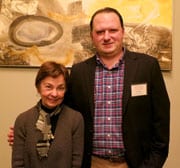Historic Seattle & Indow: Spreading Preservation Awareness through Non-Traditional Means
By Kristina Damschen Spina
Indow is a Portland-based manufacturer of interior storm window inserts. Our inserts are designed to preserve a building’s original windows by improving their performance in areas of noise, drafts, and energy consumption. We are passionate about historic preservation, so we created a zine to engage communities around the issue.
A zine (pronounced zeen) is a small DIY self-published work of original or appropriated texts and images, often produced via photocopier. The format of making zines—unencumbered by rules relating to form, function, or purpose—allows makers to share stories about anything. As preservationists work to expand the narrative on saving old places, make preservation inclusive, and reach new audiences, zines are one strategy you should add to your toolkit.
The Indow zine theme for 2021 is community sustainability and how we have managed to maintain a sense of community and place in isolation. When we announced this theme, we asked: “How do we celebrate a place when we cannot stand in it? How do we lift up a community when we cannot gather?” We are grateful for creative people like those at Historic Seattle, who answered our question by asking in return: “Who says you have to stand still in a place to celebrate it?” Historic Seattle’s bike tour of historic sites in the Emerald City, which they’ve been organizing for several years, is an ingenious way to safely gather people and honor the city’s old places.
This year’s Preservation Month Bike Tour offered three routes throughout the city highlighting the remaining Paul Thiry architecture. Thiry introduced Seattle to European Modernism, one of the subgenres of which is Brutalism, used widely in the communist countries of the Eastern Bloc. As a result, many Seattleites had difficulty warming to this new architectural aesthetic popping up in the city. Famously, a Thiry-designed home went on sale for $1 but was demolished after no one purchased it. While Thiry’s contributions may not be widely celebrated, they are part of Seattle’s architectural heritage, and we applaud Historic Seattle for teaching this part of the city’s history.
Did you attend Historic Seattle’s Preservation Month Bike Tour? Consider making your own zine to spread awareness about preservation in your community. Check out Historic Seattle’s submission to the 2021 Indow zine for inspiration. You can find this year’s Indow zine and all of our past editions on the Indow online zine library. Past zine themes include preservation and illuminating our cities with neon. Looking through our past zines will help to demystify the process of making your own. Watch out for our online zine submission page for an update on next year’s zine theme.
If you have a great idea for your zine, but aren’t quite sure how to get it off the ground, we got you covered. Take a look at the Indow Zine Resource Center to learn how to create your first zine. Be sure to watch the zine workshop for wonderful insight provided by the panel with members of the Indow marketing team and guests.
Indow is a generous sponsor of Historic Seattle’s 2021 Community Education & Advocacy Programming. This post is part of a series of guest blogs submitted by members of the Historic Seattle community. The views and opinions expressed in guest posts are those of the authors and do not necessarily reflect the positions of Historic Seattle.
